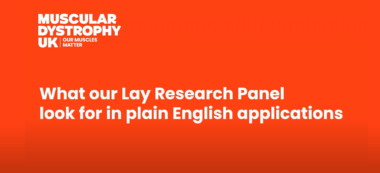If you are an award holder and want information on how to manage your grant see our Manage Your Grant page. If you still have questions that are not answered in the FAQs below, email researchgrants@musculardystrophyuk.org.
Grant Frequently Asked Questions
Our grant funding processes for each grant scheme are described on our open grant calls and grant calls pending a decision pages. The types of grant and available calls can be found in our funding opportunities.
If you would like to be notified of upcoming calls email the research ream to be added to our circulation list researchgrants@musculardystrophyuk.org. Applications are made online through our secure online application system.
The processes that we use to make decisions on grant funding are described in the open grant calls and the grant calls pending a decision pages.
If you have a question about grant applications email our research team researchgrants@musculardystrophyuk.org.
The remit is to increase understanding of the underlying causes of disease, develop potential treatments and improve the quality of life of people living with neuromuscular conditions. Refer to our Research Strategy for more information.
We’re only able to fund research within the UK at the present time, although international collaborations are encouraged. Any exceptions to this will be made known when the grant call(s) are announced – check the funding opportunities page for more information.
From 2022 to 2024 the average success rate of grant applications was approximately one in three.
- A description of who can apply can be found within the guidance related to the grant call you are applying to.
- Funding is available for those undertaking research in all disciplines relating to conditions which fall within the remit of Muscular Dystrophy UK. See a list of conditions within our remit. Principal applicants must hold a contract which extends beyond the duration of the proposed grant period, at an Institution approved by us.
- We welcome project and proof-of-principle applications from established researchers or early-career researchers. Researchers should have a research degree e.g. PhD or MD OR, if an allied health professional, should have a postgraduate degree (PhD, MPhil or Masters degree) and/or demonstrate significant experience with trial procedures, conducting research and monitoring its progress.
- We also welcome applications for PhD studentships. Students cannot be applicants but can be a co-applicant.
The types of award being offered may change each year depending upon the priorities of the charity. More information can be found on our funding opportunities page.
There is only one main application round per year. The number of grants funded each year varies, depending on the amount of available funds for the year and on the cost of the grants being considered. We endeavour to fund as many projects as possible in order to maximise the potential of the grant portfolio.
Yes. We do not limit the number of grants held by any individual. However, each applicant can only submit up to one application per grant type in each grant round. Multiple applications for the same grant type will not be accepted.
One resubmission of a previous Muscular Dystrophy UK grant application is allowed to the grant round. This should be indicated, along with the amendments to the original application, in the relevant field on the application form.
We do not cover recruitment costs. These should be covered by the employing institution/university.
Due to limited funding, we do not provide funding for travel to and attendance at conferences.
